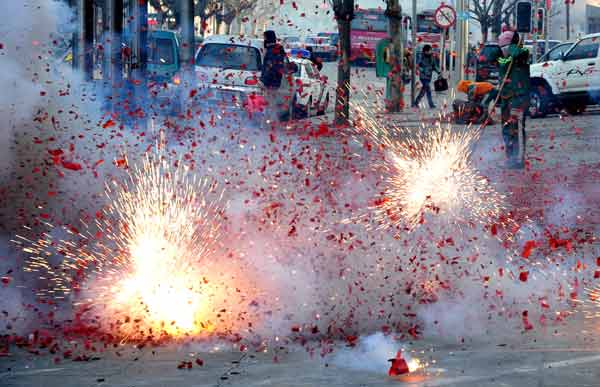 |
|
Firecrackers explode on a street in Dalian, a coastal city in Northeast China’s Liaoning province, on Wednesday. LU ZHENGWEN / XINHUA |
A rise in the number of fire accidents during the Spring Festival holiday has prompted a new round of debate over proposals to readopt firework bans in China's largest cities.
From Feb 2 to Feb 8, 11,813 fire accidents took place across the country, causing 40 deaths, 37 injuries and more than 56 million yuan ($8.5 million) in economic loss, the Ministry of Public Security reported on its website on Wednesday.
And that figure did not include the first fire of the Year of the Rabbit. That blaze ignited in the early morning of Feb 3 and caused 3 billion yuan in damage to a 152-meter-high building in Shenyang, capital of Liaoning province.
Two days later, a forest fire caused by fireworks left six dead and three injured in Zhejiang province's Chun'an county.
And on Monday, fireworks kindled a 1,000-year-old Buddhist temple in Fuzhou, capital of East China's Fujian province.
In Beijing, two were killed and 388 injured by firecrackers during the Spring Festival holiday, the firework management office of Beijing reported on Tuesday.
"With such a high population density and so little precipitation this winter, allowing fireworks to be shot off in cities is the same as letting thousands of people play with fire at the same time," Shi Shusi, a senior journalist said in his blog. He suggested that the Beijing government consider readopting its former prohibition on the use of fireworks.
Cities that kept the prohibitions, meanwhile, haven't necessarily achieved their goals. Despite the existence of a fireworks ban in Guangzhou, the capital city of Guangdong province, illegal pyrotechnics led to 30 forest fires on Feb 2.
Some argue repealing the prohibition would only lead to worse results.
"If there wasn't a ban, it would be disastrous," said Kuang Jiawei, a bank worker in Guangzhou. "There would be more fire hazards, as well as air pollution that would threaten people's health, like what is happening in Beijing."
Although setting off fireworks is regarded as a tradition during the Spring Festival holiday, many city governments, like those is Beijing, Shanghai and Shenzhen, banned fireworks in the 1990s in response to fire dangers and growing concerns over air pollution. But most of the bans were later repealed following vociferous protests from the public.
"People have been celebrating the festival with the sound of crackling fireworks for 1,000 years," said Wang Zuoji, a 71-year-old expert on Beijing's culture and folk arts. "If you prohibit fireworks, you will ruin the festive atmosphere."
"I prefer retaining traditions, but a high fire risk doesn't have to be the price you must pay, because firecrackers don't necessarily have to be made to be dangerous," Wang said.
Traditionally, firecrackers were composed of powder wrapped up in paper rolls as thin as chopsticks, but now they are on sale in various sizes and shapes, some of them being as large as a watermelon.
"Fireworks kill people every year," said Wu Zuolai, a researcher at the Chinese National Academy of Arts.
In order to reduce the risks, Wu called on the government to prohibit customers from buying and setting off fireworks, and instead to organize official displays in public places during the Spring Festival.
In a recent online survey carried out by huanqiu.com, 45 percent of the 23,369 respondents said they were in favor of resuming the bans on fireworks. The rest said they wanted to stick with tradition.
Li Wenfang contributed to this story.
China Daily
(China Daily 02/10/2011 page4)